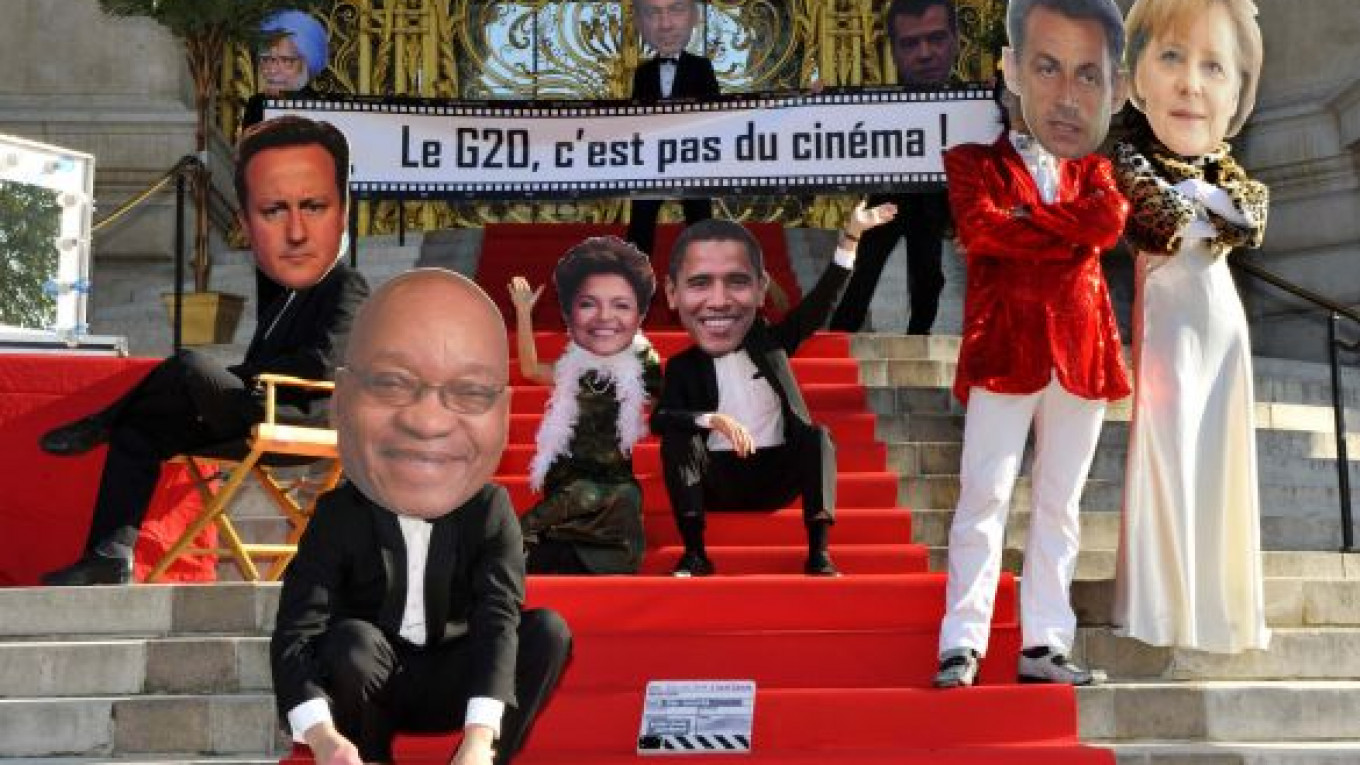Russia is ready to help the indebted euro zone by providing up to $10 billion through the International Monetary Fund and could consider offering bilateral support to individual countries if the bloc asks for such help, Kremlin aide Arkady Dvorkovich said Monday.
The announcement came ahead of President Dmitry Medvedev's participation in the Group of 20 summit, which will focus on the measures to prevent a new wave of the global financial crisis.
At the summit, which will open Thursday, Medvedev will cooperate with his BRICS colleagues in a push to reduce member countries' budget deficits, as "risks remain … because no financial consolidation in Europe or the United States has been fully achieved yet," said Dvorkovich, the Kremlin's top economic adviser.
But Russia is "cautiously optimistic" about the zone's economic future amid the recent decision on the bailout plan for indebted countries made at the European leaders' summit last week, Dvorkovich said.
"Now everything depends on whether … the measures that have been announced will be taken," he told a news conference in Moscow.
The European leaders agreed at a meeting in Brussels last week to bolster the size of the European Financial Stability Facility, or EFSF — a bailout fund created by euro-zone countries to fight the debt crisis — from 440 billion euros to 1 trillion euros.
But while the fund's officials are approaching China to get it to invest in EFSF bonds, Dvorkovich said Russia will provide up to $10 billion of financial support through IMF mechanisms, since preserving the stability of the European economy is crucial for the country.
"It's important for us that Europe remain stable because … Europe is our biggest trade and investment partner," Dvorkovich said. "If Europe is unstable, Russia's economy will enter a phase of instability."
Russia, which has the world's third-largest international reserves after China and Japan, could also consider a possibility of offering bilateral help to individual countries if such a request comes.
"There have been no official requests from the European Union yet. If our European partners make such a request — we don't rule this out — [government agencies] will consider … the possibility of providing such support," Dvorkovich said.
The option of buying Spanish government bonds was discussed at a meeting of then-Finance Minister Alexei Kudrin and Spain's economy minister, Elena Salgado, earlier this year. Dvorkovich said earlier this month that Russia is ready to help the euro zone tackle its financial problems if the European countries provide a specific bailout plan.
Another issue to be discussed at the G20 summit is developing the global trade — a crucial issue for Russia, which hopes to enter the World Trade Organization by the end of this year.
There's a high chance that the 18-year process of Russia's accession to the WTO could be completed at a conference of the member countries' trade ministers scheduled for Dec. 15, Dvorkovich said.
Russia is waiting for the outcome of negotiations between Swiss President Micheline Calmy-Rey and her Georgian counterpart Mikheil Saakashvili, which were scheduled for Monday, on the remaining issues hampering Russia's accession.
"We hope to hear about the results of these consultations in the nearest time," Dvorkovich said.
Calmy-Rey's meeting with Medvedev on Sunday was followed by Russia announcing that some details of the compromise deal proposed by Switzerland need to be specified. Switzerland is mediating Russia's talks with Georgia, the only one of the 153 WTO members blocking the accession.
Dvorkovich said Russia has no radical changes to Switzerland's proposal, but "rather style corrections."
It was unclear Monday evening whether any progress in the Swiss-Georgian talks had been made.
A Message from The Moscow Times:
Dear readers,
We are facing unprecedented challenges. Russia's Prosecutor General's Office has designated The Moscow Times as an "undesirable" organization, criminalizing our work and putting our staff at risk of prosecution. This follows our earlier unjust labeling as a "foreign agent."
These actions are direct attempts to silence independent journalism in Russia. The authorities claim our work "discredits the decisions of the Russian leadership." We see things differently: we strive to provide accurate, unbiased reporting on Russia.
We, the journalists of The Moscow Times, refuse to be silenced. But to continue our work, we need your help.
Your support, no matter how small, makes a world of difference. If you can, please support us monthly starting from just $2. It's quick to set up, and every contribution makes a significant impact.
By supporting The Moscow Times, you're defending open, independent journalism in the face of repression. Thank you for standing with us.
Remind me later.






